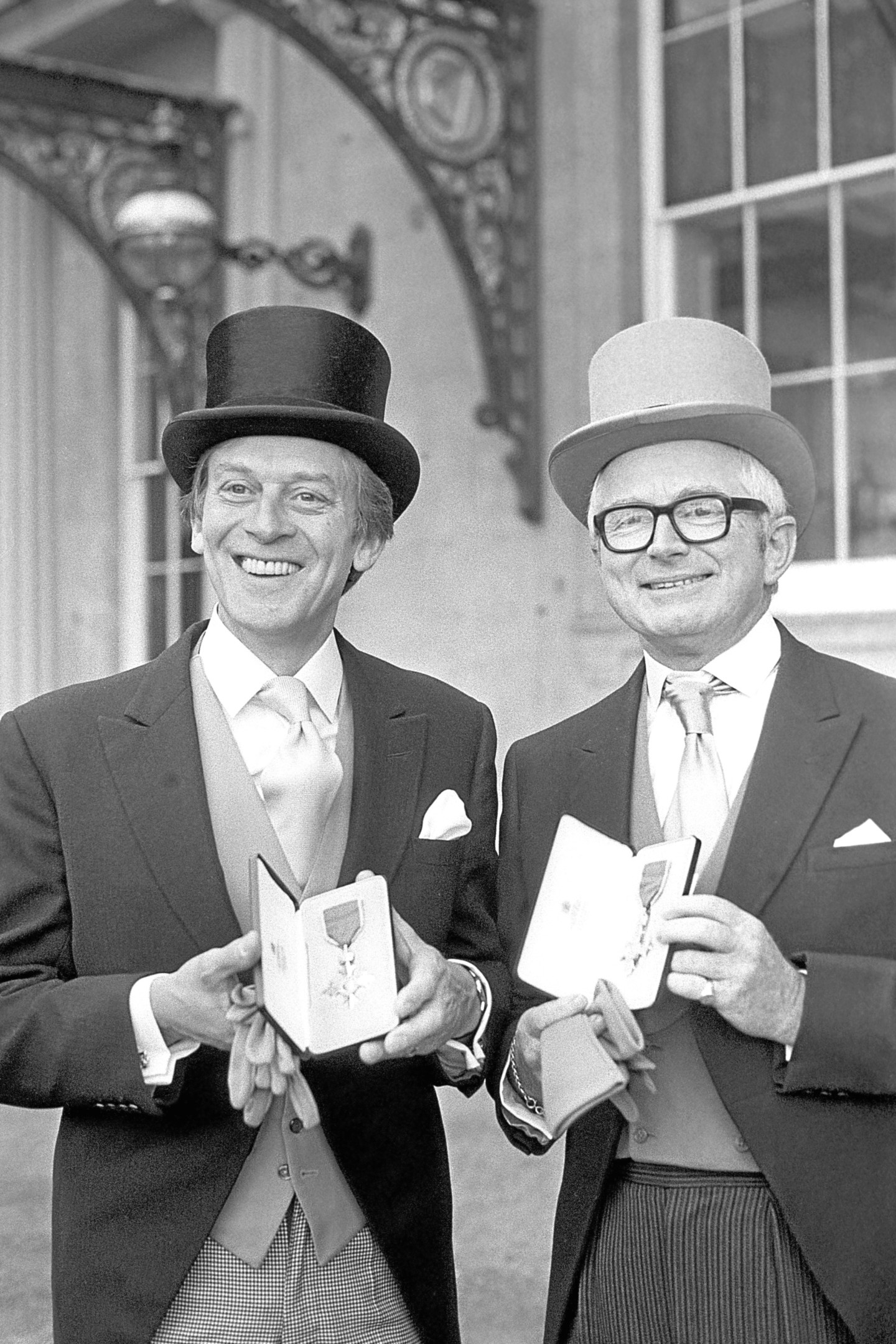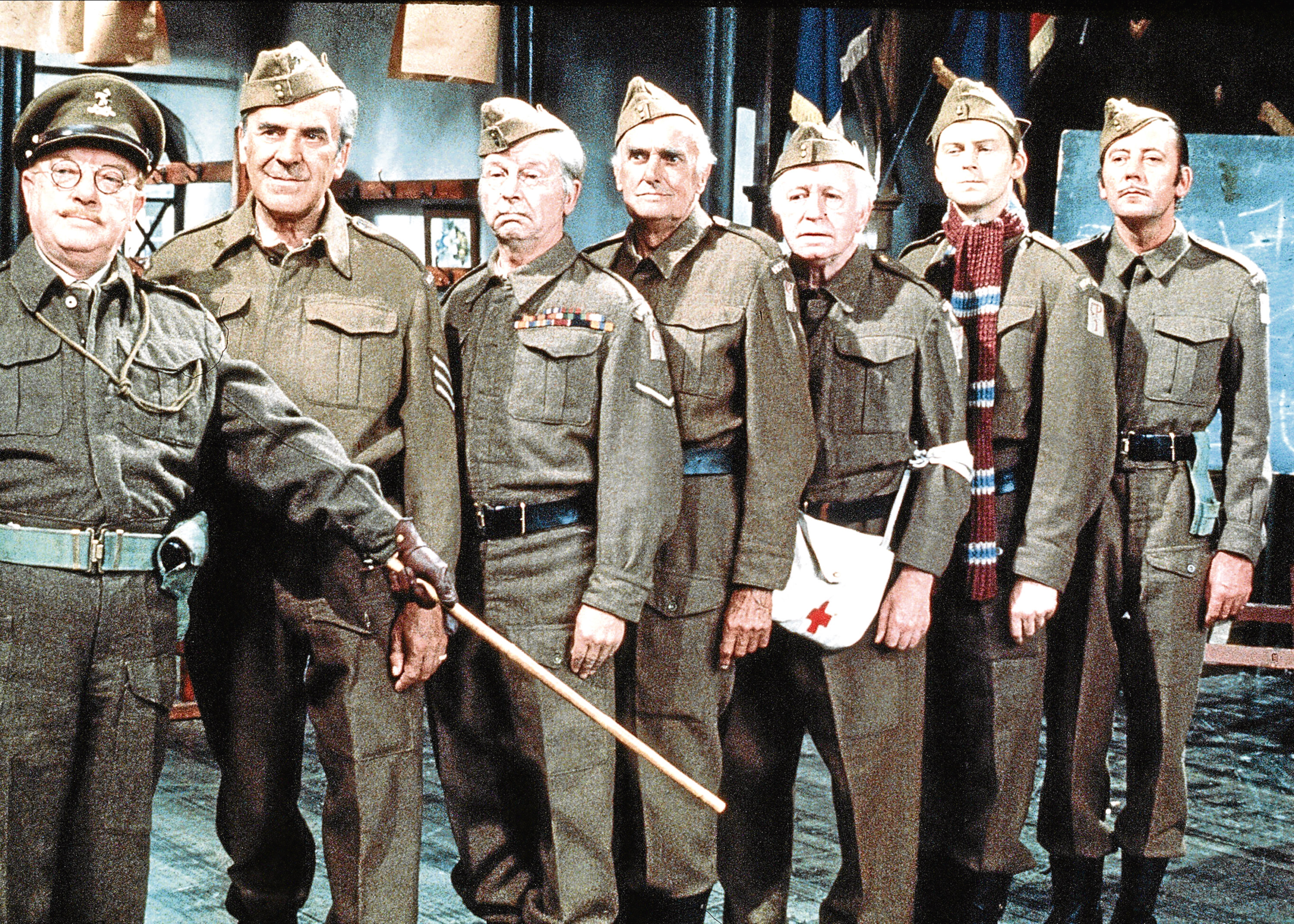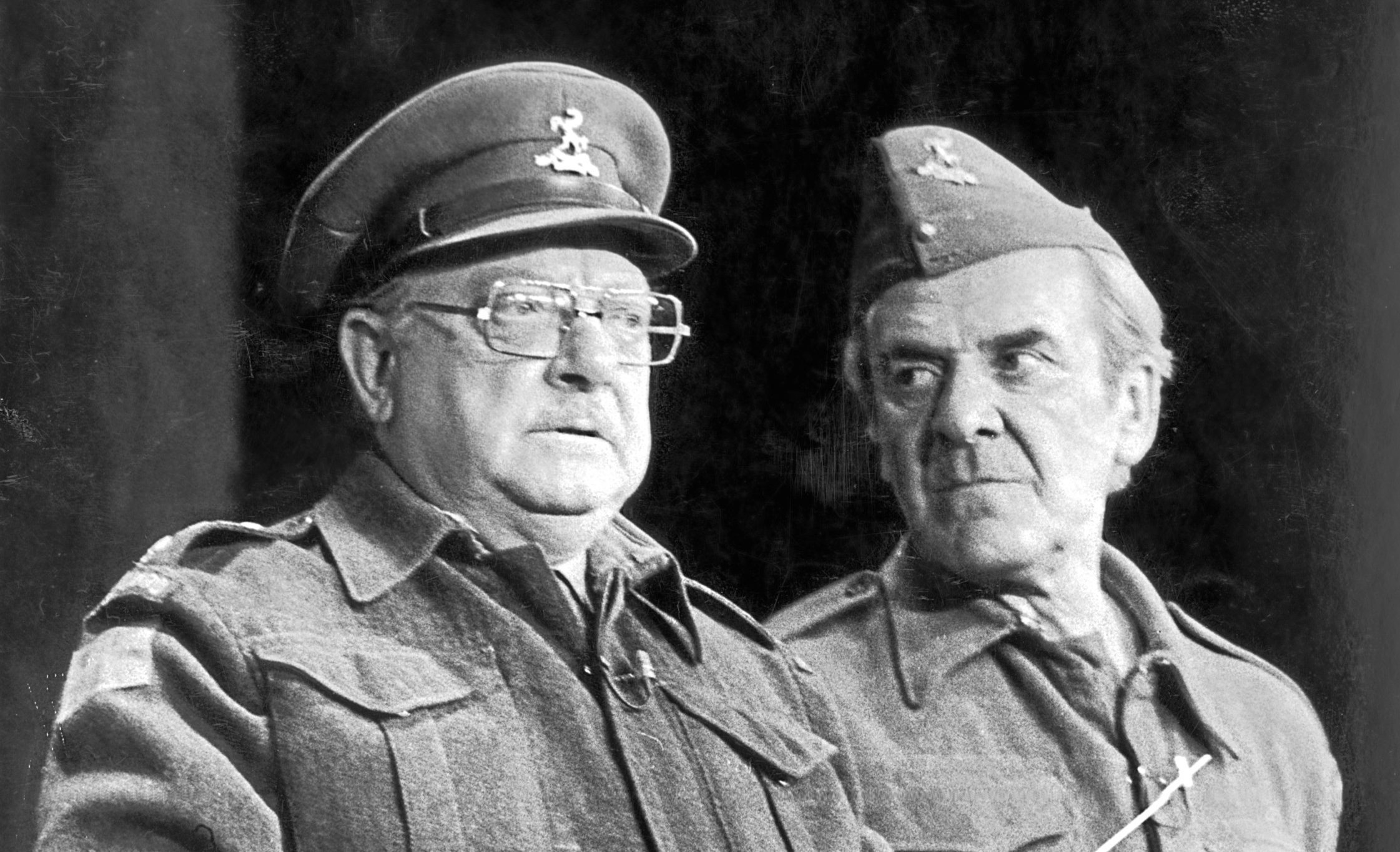
IT’S hard to imagine a time when TV audiences won’t be entertained by Messrs Mainwaring, Wilson, Jones, Frazer and the whole Walmington-on-Sea platoon.
This year marks the 50th anniversary of Dad’s Army’s screen debut, so what better time to celebrate through the memories of the sitcom’s late writers, Jimmy Perry and David Croft?
When the BBC finally gave the green light for Jimmy and David to pen six episodes of the wartime sitcom, which David also directed, the writers set about refining the main characters.
Among the first to receive their attention was peppery Private Frazer.
“We knew we had to have a Scotsman in the programme,” Jimmy Perry once told me.
“In those days, every English southern town seemed to have a Scot who was always treated with great reverence by the English — although they were inclined to be a bit disdainful of the English people around them.”
From this generalisation, the character of Frazer was born.
Next came the spiv, Walker.
“Everybody did a spiv,” explained Jimmy. “In those days, spivs traded out of suitcases all along London’s Oxford Street, and whenever things were scarce, like during the war, you could guarantee one would be around.”
As for Jones, the ageing war veteran and Walmington’s friendly butcher, Jimmy delved into his own Home Guard memories.
With him then was an old soldier who’d seen action in the Battle of Omdurman in 1898.
“He was a lance corporal, probably late 60s, and kept telling me about his war experiences with Kitchener against the Fuzzy Wuzzies!” Jimmy recalled once.
As for the catchphrase, “They don’t like it up ’em!”, that came from a sergeant who taught Jimmy bayonet drill at Colchester barracks when he was called up to the regular army in 1944.
Private Godfrey, meanwhile, dated from an era long gone, when shop assistants politely asked whether you were being attended to, or if they could help.
“They took great pride in serving customers,” Jimmy recalled. “We needed a gentle character, so Godfrey evolved.”
A vicar was required to be in charge of the church hall, the use of which was constantly argued over by Mainwaring and Hodges.
Meanwhile, the verger started out as a caretaker and didn’t don clerical attire until Episode 16, The Bullet Is Not For Firing.
Frank Pike, the baby of the platoon, who’s mollycoddled by his mother, was based on Jimmy’s own experiences as a boy, while the character of Warden Hodges explored an area of society that interested him.
“I’ve always been obsessed with people who never had a hope in hell of doing anything more than shuffling along in life, suddenly getting power,” Jimmy revealed.
“The warden has the power to fine people for showing a light. In Dad’s Army, we wanted someone to upset the pompous, middle-class Mainwaring, and Hodges was certainly an irritant!
“In my experience, air raid wardens were often jumped up people from minor positions who exploited the power given to them by their duties.
“Hodges was certainly jumped up, something Mainwaring blamed on the fact he was a greengrocer — which, incidentally, generated lots of mail from greengrocers!”
Once the characters had been agreed, Jimmy and David turned their attention to the difficult task of casting. Jimmy had already given the matter some thought, recording his views on the original script for the show, which was then called The Fighting Tigers.
It’s hard to imagine anyone other than Arthur Lowe, John Le Mesurier, John Laurie et al playing the roles, but Jimmy initially saw Lowe playing Sergeant Wilson and Robert Dorning, who later appeared as a bank inspector in the episode Something Nasty in the Vault, as Captain Mainwaring.
Jack Haig, meanwhile, was set to play two characters — Jack Jones, the butcher (although Jimmy had originally considered making him an ironmonger) and his twin brother, George.
Most of the cast were undefined at this early stage, but Jimmy wanted comic actor Arthur English to play Joe Walker, the spiv, even though he originally envisaged himself playing the part.
“I wrote Walker for myself,” he admitted. “But David and BBC Head of Comedy Michael Mills didn’t think it was a good idea. Sadly, I was in no position to argue.”
Jimmy was disappointed not to be acting in the series he had created, but in hindsight, he believed it was probably for the best, a view echoed by David.
“I realised Jimmy was disappointed, but I feel authors are needed in the production box to see how things are going,” he once said. “If they’re also acting, that’s difficult.”
As he possessed little power in those days, Jimmy was grateful to David for even allowing him the chance to become involved in casting discussions.
“I claim credit for Arthur Lowe!” he laughed. “I kept telling David he should be in the show but the BBC weren’t convinced, particularly Michael. I remember him saying: ‘Arthur Lowe? We don’t know him at the BBC, he doesn’t work for us.’”
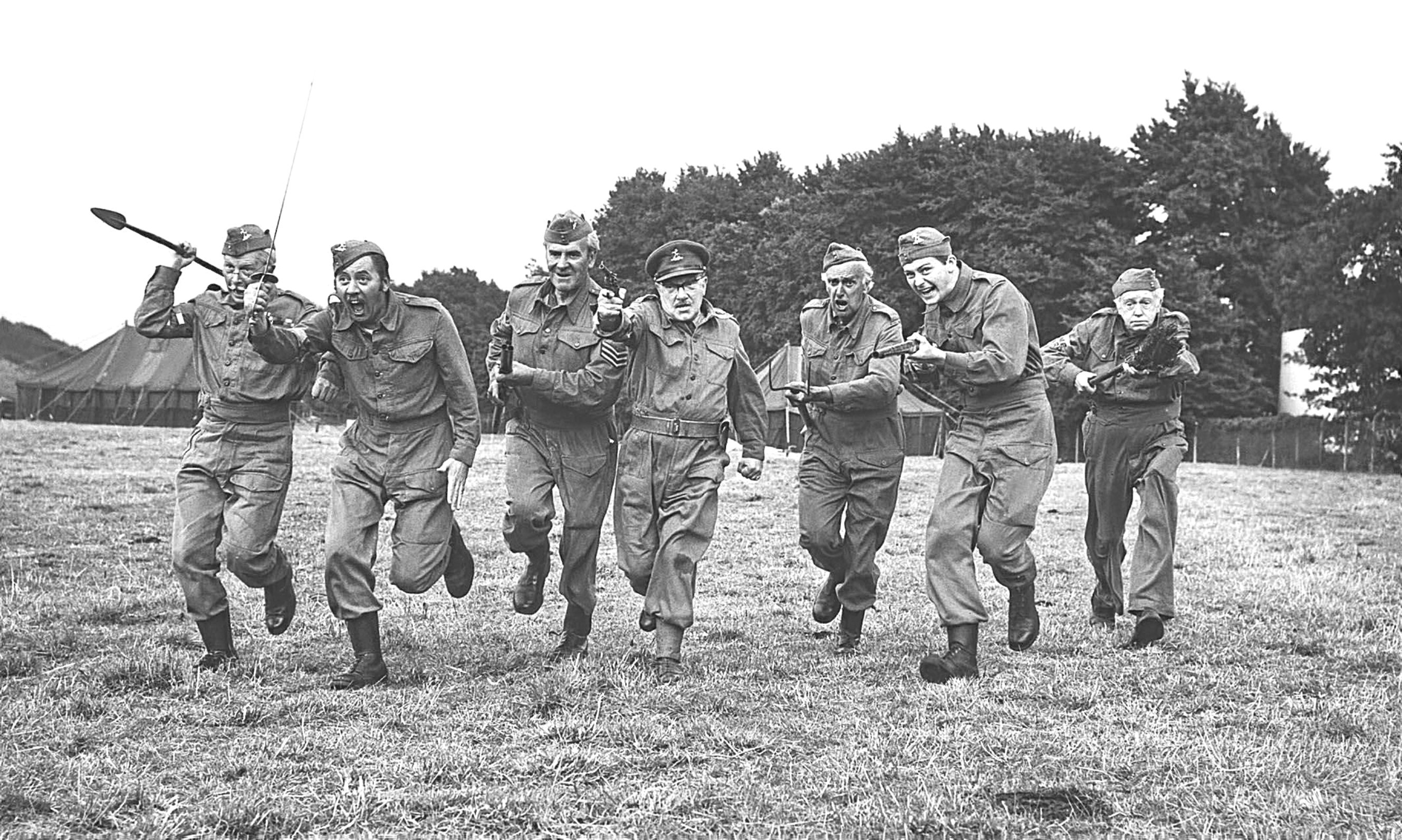
Lowe was a big success as Mr Swindley in Coronation Street, but that was a Granada production — his reputation had been established in commercial TV which didn’t appeal to the Beeb.
The part was first offered to actor Thorley Walters, and when he declined, Jon Pertwee was considered. When he also turned it down, Arthur Lowe was invited to meet the team.
After lengthy discussions, the part was finally offered to him, and he swiftly stamped his inimitable style on Mainwaring.
One of the challenges David Croft faced when working with Lowe, however, was getting him to learn his lines.
“He wouldn’t take his script home and, occasionally, some of the other actors would call me at home insisting I get Arthur to learn the lines,” he recalled.
“So I started sending two copies of the script to him with a note saying: ‘Here’s one that you can read in the rehearsal room, and another to put under your pillow in the hope that something filters through during the night!’ He wasn’t amused.”
The rest of the casting was down to David and Michael, who was responsible for bringing John Laurie’s name into the frame.
“To me, Laurie was a legend, a great Shakespearean actor and one of the finest supporting actors I knew,” said Jimmy.
Initially there were plans to make Frazer a fisherman, but Jimmy and David felt there was insufficient depth in the character, so chose the job of undertaker.
Arnold Ridley was selected to play Private Godfrey because he’d worked for David Croft on Hugh and I.
“He was terribly funny and a lovely actor,” explained David.
“I was keen on Jimmy Beck for Walker, while Ian Lavender, who was one of my wife’s clients, had just played a marvellous part in Flowers At My Feet. He was obviously a good actor and as young as we could go for Pikey.”
When it came to Jones, David agreed with Jimmy that Jack Haig was ideal.
“The trouble was, he’d just been offered 26 programmes of Whacky Jacky, a character he more or less created himself for children, and that’s the part he accepted,” recalled David, who then decided to offer the role to Clive Dunn.
It was Michael who suggested John Le Mesurier, though he wanted him to play the captain.
“But then we came up with the idea of switching the classes, and he was cast as Sergeant Wilson,” David explained.
“John was an extraordinary performer because he never seemed totally with it. But he was a very clever man, always word-perfect and at rehearsals 15 minutes before everyone else.”
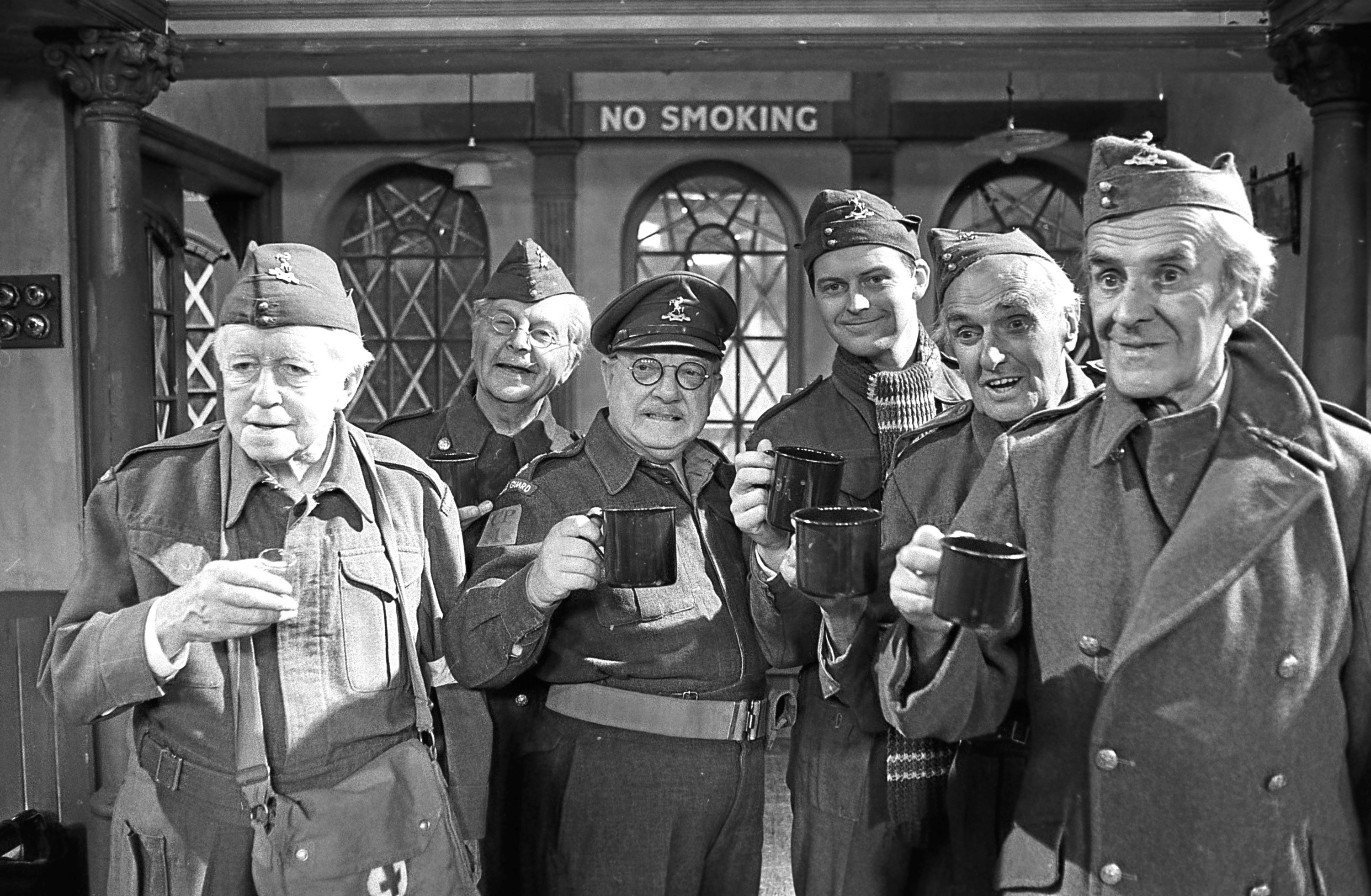
David knew that Bill Pertwee (Hodges) possessed a brilliant sense of humour and was a great enthusiast, so was ideal for the cast. Being a bubbly character, one of his roles was to make the others happy, which he achieved.
“He was one of the few actors who never rang me up asking if there was anything for him in the next show,” recalled David. “He knew I’d use him when I could.
“I had cast Frank Williams in clerical roles several times before and he’s a marvellous actor. And I’d used Edward Sinclair before, as a short-sighted funeral director, and he was terribly funny as the verger. His partnership with the vicar was wonderful.”
With casting in place, rehearsals and recordings began, marking the birth of a genuine TV legend which we’re still savouring today.
Every aspect of Perry and Croft’s creation clicked effortlessly into place. Jimmy thought up the name Brightsea-on-Sea but that was changed to Walmington-on-Sea before the first episode got under way.
Location filming, though, took place not on the South Coast but in Norfolk.
As David once explained: “We started filming in April and wanted somewhere that had lots of evergreen because it was supposed to be summer.
“We also wanted to film undisturbed so the big battle areas around Thetford were ideal.”
The Jimmy Perry-David Croft partnership was ideally suited to the development of a programme like Dad’s Army.
Jimmy brought an incredible enthusiasm and first-hand knowledge of the Home Guard, whereas David’s professional background in TV meant he knew what sort of jokes and visual effects would work on the small screen.
Throughout the sitcom’s life, which extended to 80 episodes, it’s remarkable that the standard never dipped, testament to the quality of writing, performing and production.
Hopefully, the Walmington-on-Sea Home Guard unit will be on parade for many years to come.
Richard Webber is the author of several authorised books about the wartime sitcom, including The Complete A-Z of Dad’s Army, published by Orion, and Dad’s Army: A Celebration, issued by Virgin Books.

Enjoy the convenience of having The Sunday Post delivered as a digital ePaper straight to your smartphone, tablet or computer.
Subscribe for only £5.49 a month and enjoy all the benefits of the printed paper as a digital replica.
Subscribe